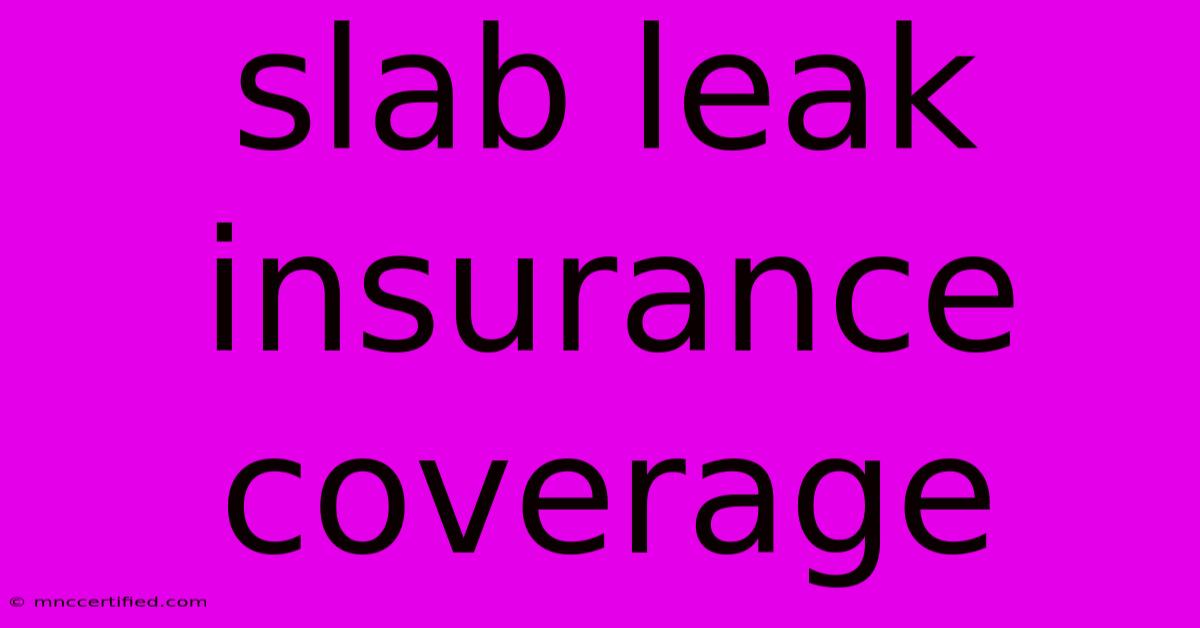Slab Leak Insurance Coverage

Table of Contents
Slab Leak Insurance Coverage: What You Need to Know
Discovering a slab leak can be a homeowner's worst nightmare. The hidden nature of these leaks, occurring beneath your home's concrete foundation, leads to significant water damage, structural issues, and hefty repair bills. This is where understanding your slab leak insurance coverage becomes crucial. This comprehensive guide will delve into the intricacies of insurance and slab leaks, helping you navigate this potentially devastating situation.
What is a Slab Leak?
Before we dive into insurance, let's clarify what a slab leak actually is. A slab leak is a water leak that occurs within the pipes embedded in your home's concrete foundation slab. These leaks can stem from various causes, including:
- Corrosion: Over time, pipes can corrode, leading to cracks and leaks.
- Ground Shifting: Changes in soil conditions can put pressure on pipes, causing them to break.
- Poor Installation: Initially faulty pipework can manifest as leaks years later.
- Tree Roots: Aggressive tree roots can penetrate and damage pipes.
Does Homeowners Insurance Cover Slab Leaks?
The short answer is: sometimes. While most homeowners insurance policies cover water damage, the coverage for slab leaks specifically depends on several factors:
- The cause of the leak: Coverage often hinges on whether the leak is considered sudden and accidental. A slow, gradual leak due to corrosion might not be fully covered, while a burst pipe due to a sudden event might be.
- Your policy's specific wording: Carefully review your policy documents. Look for exclusions related to foundation damage, water backup, or gradual leaks. Contact your insurance provider for clarification if anything is unclear.
- Your deductible: Remember that your deductible will apply to any covered claim. This is the amount you'll pay out-of-pocket before your insurance kicks in.
What is Typically Covered?
If your insurance does cover your slab leak, expect coverage for:
- Repairing the damaged pipes: This includes the cost of excavating the concrete, replacing the pipes, and restoring the slab.
- Water damage remediation: This covers the cost of drying out affected areas, repairing water-damaged materials (drywall, flooring, etc.), and potentially replacing damaged belongings.
What is Typically Not Covered?
Keep in mind these exclusions are common:
- Preventative maintenance: Insurance generally doesn't cover the cost of proactively replacing aging pipes to prevent future leaks.
- Pre-existing conditions: If the leak was present before your policy started, it's unlikely to be covered.
- Gradual leaks: Slow leaks that cause progressive damage over time may not be covered.
- Foundation damage (in some cases): While water damage to the foundation might be covered, structural damage of the foundation itself might be a separate issue.
Minimizing Your Risk: Preventative Measures
While you can't completely eliminate the risk of a slab leak, you can take steps to reduce the likelihood:
- Regular plumbing inspections: Schedule annual inspections by a qualified plumber to identify potential problems early on.
- Monitor your water bill: A sudden spike in water usage could indicate a leak.
- Listen for unusual sounds: Listen for unusual hissing or running water sounds, especially near your foundation.
- Consider pipe replacement: If your pipes are old, consider proactively replacing them.
Filing a Claim: What to Do If You Suspect a Slab Leak
If you suspect a slab leak, act quickly:
- Turn off the main water supply: This will prevent further damage.
- Document the damage: Take photos and videos of the affected areas.
- Contact your insurance provider: Report the leak immediately and follow their instructions for filing a claim.
- Hire a qualified plumber and contractor: Obtain multiple estimates for repairs and restoration.
Beyond Homeowners Insurance: Additional Coverage Options
In some instances, you might consider supplemental coverage:
- Service line coverage: This specific policy often covers the repair or replacement of pipes connecting your home to municipal water and sewer lines. This can be vital if the leak originates outside your foundation.
- Flood insurance: While flood insurance primarily addresses flood-related water damage, it could offer partial coverage depending on the circumstances of the slab leak.
Understanding your slab leak insurance coverage is paramount. By proactively reviewing your policy, taking preventative measures, and acting swiftly in case of a leak, you can mitigate the financial and emotional burden of this unexpected event. Remember to consult with your insurance provider and qualified professionals for personalized advice.

Thank you for visiting our website wich cover about Slab Leak Insurance Coverage. We hope the information provided has been useful to you. Feel free to contact us if you have any questions or need further assistance. See you next time and dont miss to bookmark.
Featured Posts
-
Car Insurance Little Village
Nov 30, 2024
-
Victorias Secret Black Friday 40 Off
Nov 30, 2024
-
Tracking Best Black Friday 2024 Deals
Nov 30, 2024
-
Evaluating Georgias Backup Qbs
Nov 30, 2024
-
Smart Insurance Orange Texas
Nov 30, 2024